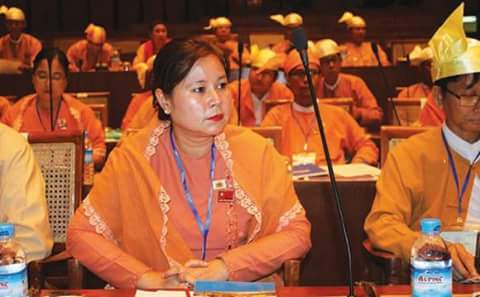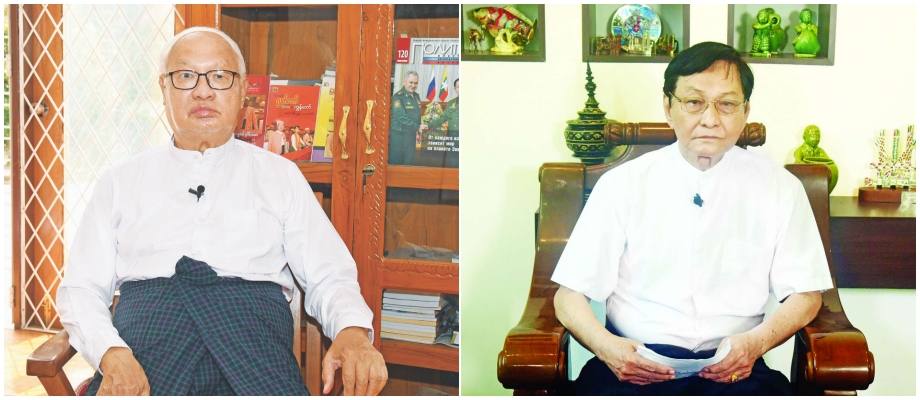Myanmar’s military regime set up two National League for Democracy (NLD) members to sell the junta’s plan for a general election next year to jailed former State Counselor Daw Aung San Suu Kyi.
Daw Sandar Min, a former NLD Yangon Region lawmaker, and U Toe Lwin, the deputy chairperson of NLD Ayeyarwady Region, met with Daw Aung San Suu Kyi at Naypyitaw prison last month.

Daw Aung San Suu Kyi reportedly looked furious after the meeting and dismissed their proposals.
Although neither the regime, which is seeking legitimacy through the planned poll, nor the NLD has discussed the idea in public, the NLD did issue a press release saying it has assigned no one to meet and negotiate with the regime, suggesting that there are renegade NLD members.
More than 200 NLD lawmakers accepted political pensions—a sum of money given to members of parliament when their terms end—from the regime. The junta also claimed at a press conference that some NLD lawmakers and members are siding with the regime.
Daw Sandar Min is known to have close ties to junta spokesman Major General Zaw Min Tun and other high-ranking officers. She is one of the few NLD members — nearly ten — who is looking to run in the election the junta is planning to hold in 2023. The proposed poll has been denounced by a majority of the population and the civilian National Unity Government (NUG).
Most NLD members have been in hiding since the coup and many have been killed by the junta.
This is not the first time that the Myanmar military has taken advantage of self-seeking politicians to create divisions within the NLD.
When the previous military regime’s State Peace and Development Council, led by Than Shwe, announced a general election in 2010 to legitimize the army-drafted 2008 Constitution, a tool for continuing military control of Myanmar, a small splinter group of the NLD wanted to contest the election. The majority of members, including Daw Aung San Suu Kyi, U Tin Oo and Hanthawaddy U Win Tin, called for a boycott.
Other members of the NLD’s central executive committee including U Thein Nyunt, U Khin Maung Swe and Dr. Than Nyein, a brother-in-law of former military spy chief General Khin Nyunt, left the party to establish the National Democratic Force (NDF) Party. U Thein Nyunt and U Khin Maung Swe were both appointed to the regime’s governing body, the State Administration Council (SAC) following last year’s coup.

At the time, Dr. Nay Win Maung, the founder of civil society organization Myanmar Egress, who has a conciliatory approach toward the junta, continually propagandized that there would be a happy ending if only Daw Aung San Suu Kyi played according to the military’s rules and contested less than 50 per cent of constituencies.
A total of 37 pro-regime political parties contested the 2010 poll with 1,154 seats up for grabs. The military’s proxy Union Solidarity and Development Party (USDP) won 882 seats, the National Unity Party 64 seats, the Shan Nationalities Democratic Party 57 seats, and the NDF won 16 seats. The election was widely criticized as rigged in favor of the USDP.
There were reports of voters mistaking the NDF’s logo, which features a traditional bamboo hat, for the NLD in the vote. The bamboo hat is also the emblem of the NLD.
“If someone does something out of their beliefs, I think it would be better if they do it separately. It is not the best practice to copy other organizations or forces,” Daw Aung San Suu Kyi said at the time.
It was the first and last time that the NDF won a seat in parliament.
In 2012, 17 political parties including the NLD contested by-elections. The NLD secured a landslide winning 43 of the 45 seats up for grabs. The NDF didn’t win a single seat, and neither did its splinter party, the New National Democracy Party (NNDP).
The 2015 general election was contested by 91 parties. Again, the NLD won by a landslide, taking over 77 per cent of all seats and forming the first civilian government since the first military takeover in 1962.
Meanwhile, the NDF and the NDDP drew closer to the USDP. Under the auspices of the USDP, 34 political parties, including the NDF and NNDP, met with military chief Min Aung Hlaing before the 2020 November election.
The NLD again won a huge victory, taking 82.4 per cent of seats. The NDF and NNDP failed again, taking no seats.
But U Khin Maung Swe and U Thein Nyunt were appointed to the SAC when junta boss Min Aung Hlaing seized power in last year’s coup, citing alleged fraud in the 2020 poll as the excuse for the putsch.
Both their political careers had already reached a dead end before the military takeover. But when U Thein Nyunt and U Khin Maung Swe chose to be followers of Min Aung Hlaing, they became the object of disgust and loathing for the Myanmar people.
That is a lesson for NLD lawmakers and party members who are considering joining the military regime. Earlier this week, the NDF declared its support for next year’s planned poll, describing it as a solution to the ongoing political crisis in the country.
While the proposed election has been called fraudulent and a recipe for continued violence by the NUG and much of the international community, the NDF has vowed to campaign hard.
Of the over 90 registered political parties in Myanmar, the regime has only targeted the NLD, rejecting its electoral victory, unfairly detaining and prosecuting NLD party leaders, destroying party offices and sealing off the houses of party members.
If NLD lawmakers and party members still want to cooperate with the regime after all that, they are committing political suicide and will be treated with the same disgust and loathing U Thein Nyunt and U Khin Maung Swe have earned.
The NLD has already said that it will not recognize any junta-organized election.

















